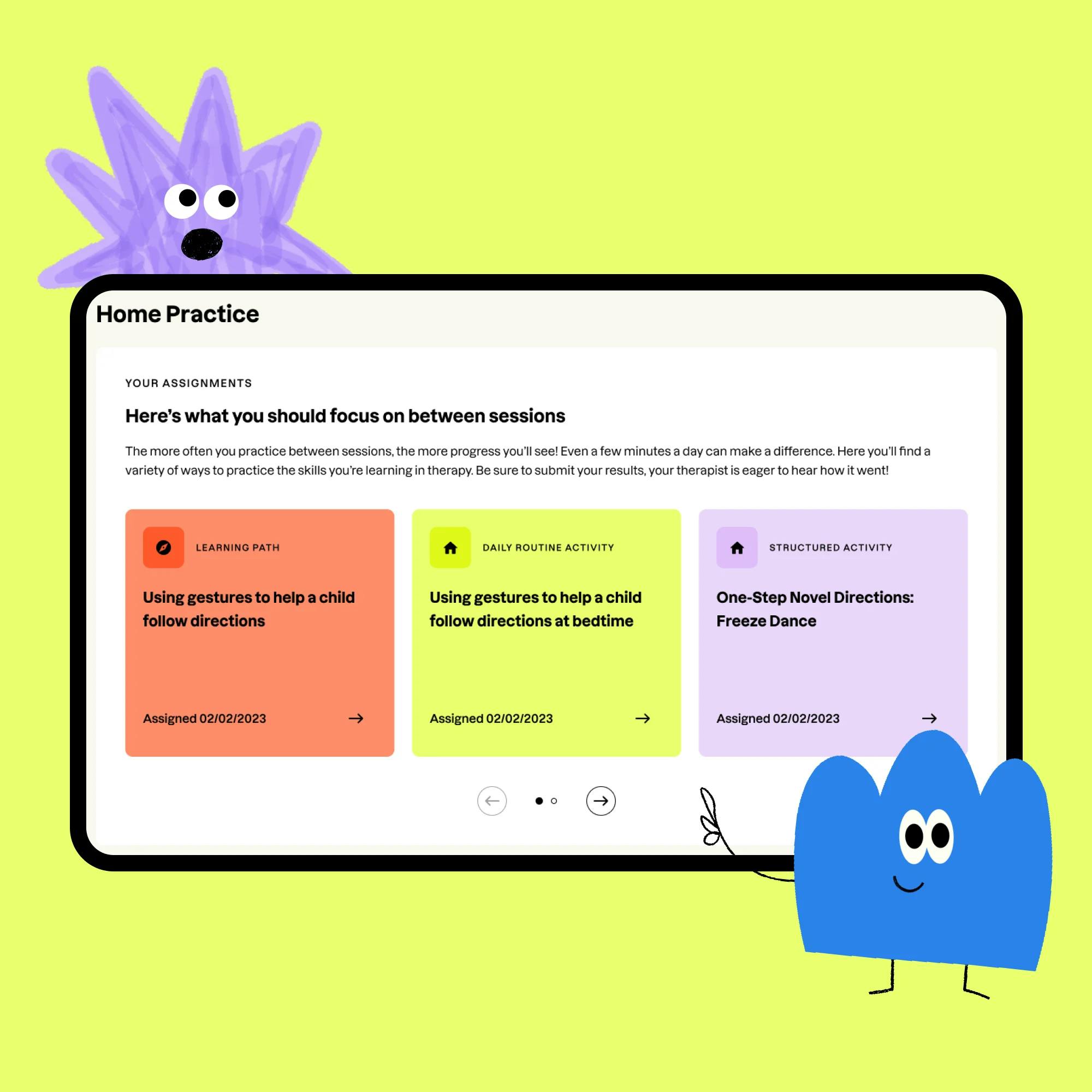
How Online Speech Therapy Helps Toddlers Communicate
 Alexis Irazoque, M.S., CCC-SLP
Alexis Irazoque, M.S., CCC-SLP
At Expressable, we often hear from parents wondering how online speech therapy for toddlers works. If your little one isn’t talking yet, struggles to follow directions, or isn’t using as many words as other children their age, you may be considering speech therapy to support their communication development.
One of the biggest questions parents have is whether online speech therapy is a good fit for their toddler. Traditionally, therapy meant traveling to a clinic or having a speech-language pathologist visit your home. But today, online speech therapy for toddlers is a proven, convenient, and effective option for many families. Let’s explore how it works and why it may be the right choice for your child.
Curious or concerned?
Our free screener is tailored by age and covers all areas of speech, language, and feeding. Find out if your child might need speech therapy.
 Screener for children
Screener for childrenHow does online speech therapy for toddlers work?
Let’s get one thing out of the way: A speech therapist would never recommend or expect a toddler to sit in front of a screen for 30 minutes. That’s not how children learn best or gain the skills needed for speech and language development.
Online speech therapy for toddlers is highly individualized, with sessions tailored to each family and their child’s specific speech and language goals. Therapists focus on coaching parents and equipping them with the tools, knowledge, and techniques they need to improve their child’s communication abilities.
Toddlers learn language skills through play. While we often think of play as taking a break from work, it’s quite the opposite. Play is how children learn and explore the world around them. This is why developing good play skills is so beneficial to their language growth and development.
For each speech therapy session, a therapist might ask parents to have a few toys or activities on hand to engage their child. These could be items as simple as bubbles, a ball, Play-Doh, or crayons and paper. While the speech therapist can certainly initiate play activities and mirror the actions that are happening in the home, it’s essential for parents to participate.
Your speech therapist may introduce a technique, then guide you on how to expand your child's language during play. Examples can include:
Offering choices of two toys and having your child pick
Waiting to take a turn until your child says “go”
Rolling a ball back and forth to mimic a conversational exchange
Using toys for their intended purpose, like making food with a toy kitchen or speaking on a pretend phone
Targeting identification questions, like “where is the dog” or “show me the red block”
Modeling words to see if your child will imitate
What makes this method of speech therapy so rewarding is that the parent is eliciting language from their child, not the therapist. The speech therapist is there to introduce new ideas and techniques, and provide support throughout the sessions.
Parent involvement and home-based learning are also incredibly important because they help newly acquired skills “stick.” For example, your child might demonstrate a new skill in a speech therapy session. But the goal is for them to “generalize,” or use these skills in their everyday life.
That’s why in online speech therapy for toddlers, parents play a crucial role in reinforcing concepts introduced in sessions during daily interactions with their child.


Will my toddler pay attention during online speech therapy?
Parents often worry that their child might have difficulty paying attention to sessions online. Toddlers may have a history of running away when Grandma joins them on a video call, or becoming frustrated when they see Mom open up a computer without their favorite video.
Again, the focus of speech therapy sessions is on the parent, and teaching them strategies to promote language skills at home with their child.
Keep in mind that no matter where speech therapy is delivered--online or in-person--it’s often the first time toddlers are in a structured learning environment. If your child is prone to temper tantrums or has trouble paying attention, this may happen regardless of where speech therapy takes place.
The focus of online speech therapy sessions is on the parent, and teaching them strategies to promote language skills.
This adjustment to structured learning can take time. While it’s normal for some initial pushback, after a few sessions children often start building a relationship with their therapist. This motivates them to participate!
Online speech therapy for toddlers is designed to follow each child’s lead and unique interests to keep them engaged and motivated. This means using toys and activities that your child already loves to keep them attentive and motivated. If a child still has trouble or is unwilling to sit still, a certain amount of structure and direction will be provided by the therapist. After a speech therapist learns your child’s preferences and learning styles, they’ll work to tailor treatment based on their needs.

Why parent involvement is essential in online speech therapy for toddlers
Here’s the most important question to ask yourself: If you’re receiving speech therapy for 30 minutes a week, what happens the rest of the week?
Toddlers often don’t learn language from flashcards, worksheets, or fancy materials. They learn and absorb language from the people they love and interact with most: you.
In order for meaningful progress to happen, it’s crucial for families to practice speech therapy techniques in between sessions. Let’s face it: The time you have with your speech therapist is limited. The important work happens outside of therapy sessions, when a family uses techniques that help expand their toddler’s language growth during daily life.


When your speech therapist provides education and coaching on how you can meaningfully interact with your child, speech therapy doesn’t just happen 30 minutes a week. Every moment with your child becomes a language-learning opportunity, from brushing their teeth, to taking a bath, to going grocery shopping.
Every moment with your child becomes a language-learning opportunity, from brushing their teeth to going grocery shopping.
With traditional speech therapy, parents often don't participate in sessions. Online therapy, however, puts parents and caregivers in the driver’s seat. Your speech therapist is there to coach you, helping you learn ways to interact with your child to help with their language growth. Then, you’re the one using these strategies every day, in the environment that's best for your child's learning--their home.
This is how children make the most progress, and why parent-led intervention is so effective.
Key benefits of online speech therapy for toddlers
In addition to the focus on parent engagement, online speech therapy can be a great option for many other reasons:
1 Home setting
Children learn best where they’re most comfortable. When working with young kids, it’s important for everyone to feel relaxed and able to fully participate. Speech therapists often refer to this as your “natural environment.”
2 Carryover
As mentioned, even if a child learns a new skill in a “structured environment,” like a clinic, that doesn’t mean they’ll use these skills in the real world. With online speech therapy and home practice, your child is already using these new skills at home, in their natural environment.
3 Effectiveness
Many studies have compared the outcomes of children receiving online speech therapy versus conventional in-person settings. In short, online speech therapy is an effective option for the majority of communication needs and goals.


4 Convenience
Coordinating sessions around mealtime and naps, as well as packing up to travel for a therapy session, can be a lot of work with an uncooperative toddler. Not to mention those long commute times and wasted hours in the car. Online therapy allows you to choose a convenient time that fits with your family’s schedule.
5 Affordability
Online speech therapists don’t have to pay many of the traditional costs of running a clinic, like rent, overhead, and certain administrative costs. These costs can be passed down to families, which often makes online therapy more affordable.
6 Flexibility
Another great advantage of online therapy is that it can take place anywhere. As long as the internet signal is strong, a family can participate wherever they happen to be.

Get matched with a speech therapist for your toddler
In summary, “where” your child receives therapy is much less important than “how” it’s delivered. For toddlers and children of all ages, online speech therapy is an effective way for parents to learn directly from their speech therapist and build a strong working relationship. The more you feel empowered as a parent to use therapy techniques at home, the more progress your child will make toward their goals.
If you’re concerned about your child’s speech development, don’t hesitate to reach out. We'll match you with an Expressable speech therapist who's experienced in treating toddlers. We’re here to support your family every step of the way!
How Expressable Can Help
Concerned your child isn't reaching age-expected milestones? Looking for communication support from a professional? Expressable is a national online speech therapy practice serving children and adults. We treat all major areas of communication and feeding, offer flexible hours including evenings and weekends, and accept most major health insurance plans. We’re proud to have earned more than 3,000 5-star reviews from our clients (4.9/5 average).
Our therapy model is centered on parent and caregiver involvement. Research proves that empowering caregivers to participate in their loved one’s therapy leads to better outcomes. That’s why we combine live, 1-on-1 speech therapy with personalized education and home practice activities for faster progress.
Communication is more than words. It’s how we share how we feel and show who we are. We’re here to help you or your child do just that.








